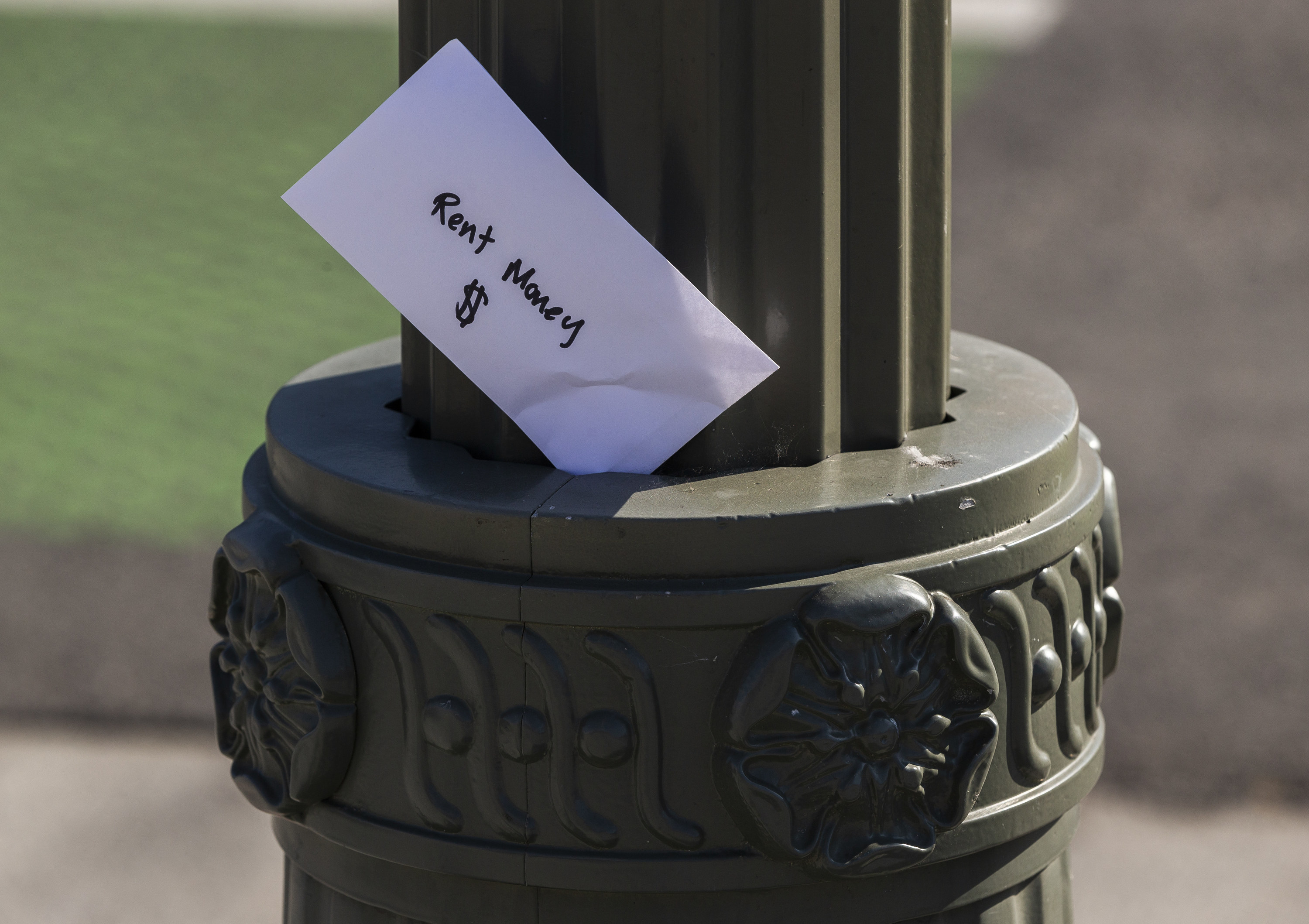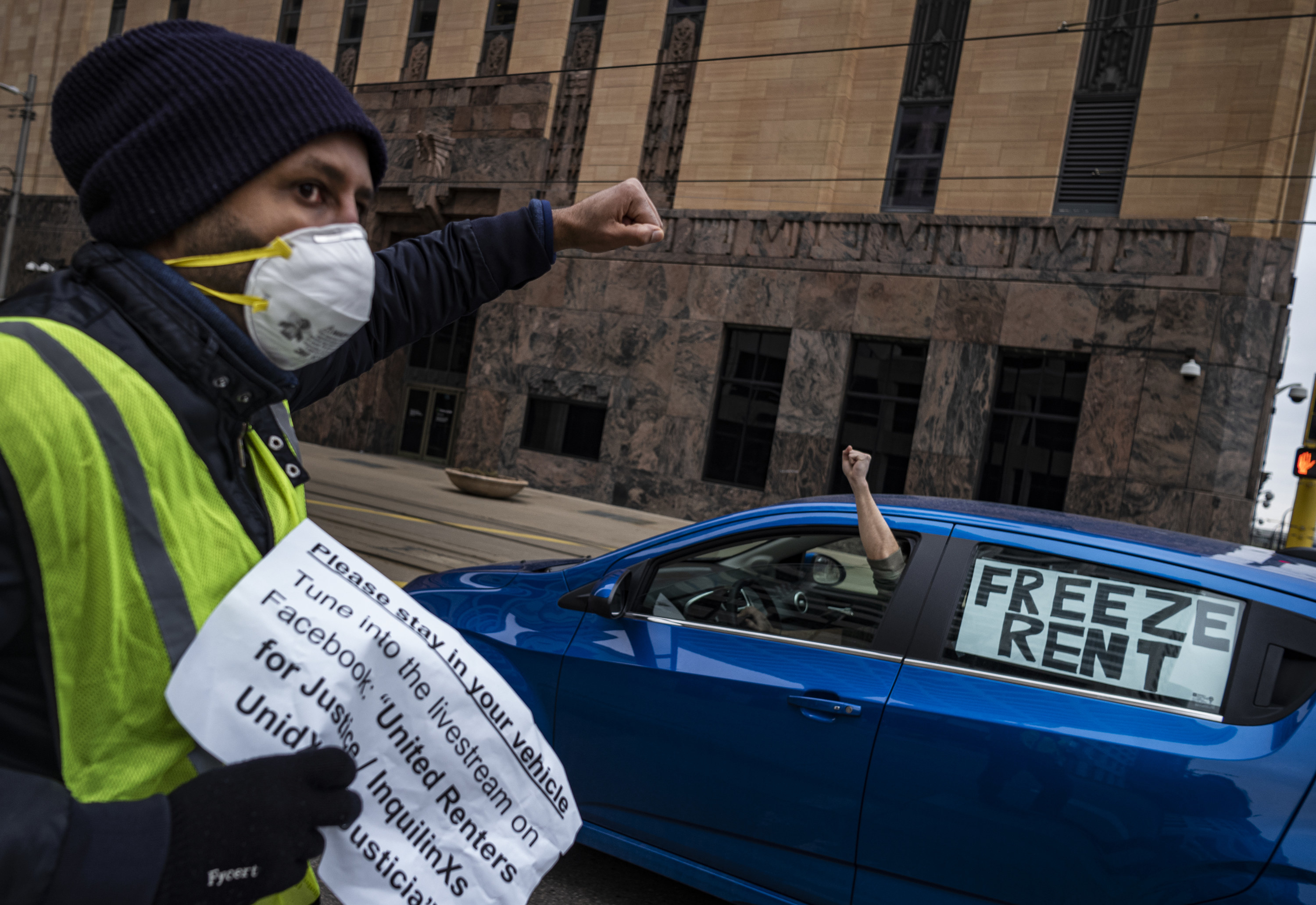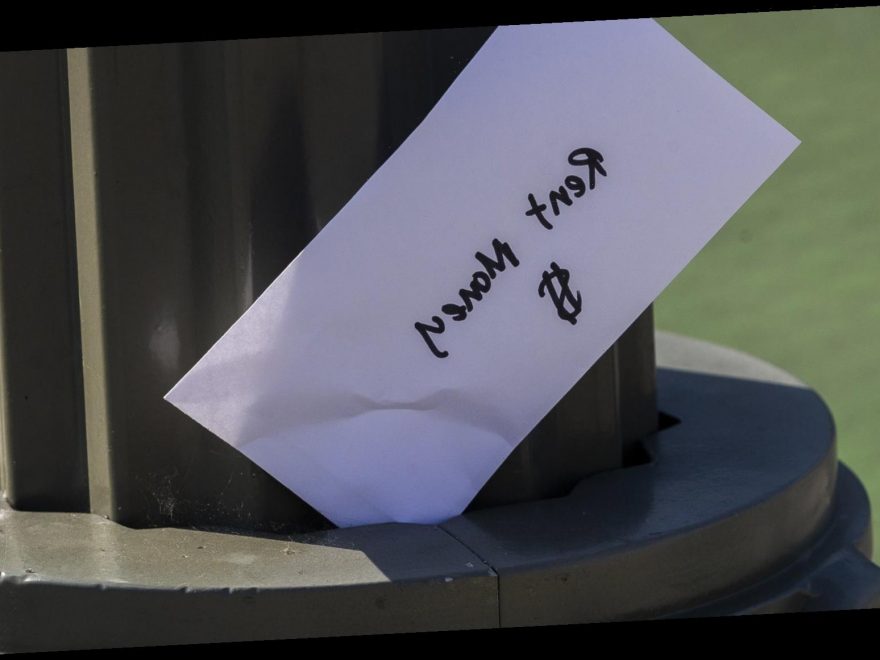- politics
- Coronavirus
Legal aid lawyers say they’re still seeing illegal evictions, and expect a surge in need from millions of newly unemployed tenants once state and local moratoriums end.
ByZoe Tillman


A paper envelope with the words “Rent Money $” written on it in Los Angeles, April 1.
The journalists at BuzzFeed News are proud to bring you trustworthy and relevant reporting about the coronavirus. To help keep this news free, become a member and sign up for our newsletter, Outbreak Today.
WASHINGTON — On March 19, three days after an eviction moratorium took effect in New York in response to the novel coronavirus, Akil Mayfield was evicted from his Queens apartment — his landlord had changed the locks and wouldn’t let him back in.
Mayfield, who is 45 years old and has a disability, spent several days at a YMCA until his mother flew up from Florida and he could stay with her at a hotel. He told BuzzFeed News that he was worried about his safety if he went to a shelter and was scared of being exposed to the coronavirus during the two weeks that he was out of his home.
“I was feeling very hopeless and violated,” he said.
Mayfield is back in his home now, but it took an emergency eviction challenge in court. In an April 2 order, the judge concluded that Mayfield “was illegally forced out,” noting there was not only evidence that he lived in the apartment, but also that he had paid his rent.
There are moratoriums preventing landlords from evicting residents in all but five states at the state or local level due to the coronavirus pandemic, according to the Eviction Lab at Princeton University. But lawyers who work with low-income clients told BuzzFeed News that despite moratoriums and stay-at-home orders intended to stop the spread of COVID-19, the disease caused by the novel coronavirus, landlords and property owners are still trying to force people out.
“The cases that we are seeing are people who are changing locks without a marshal — just the landlord doing it themselves, an illegal lockout,” said Edward Josephson, director of litigation for Legal Services NYC. His organization has also handled cases of landlords cutting off services to force out tenants — in once case, a landlord in Brooklyn sealed off access to bathrooms, he said.
Legal services providers said that once state officials lift temporary eviction moratoriums, they’re bracing for a flood of calls not only from existing low-income clients, but also from newly unemployed Americans unable to afford housing and facing eviction, lawfully or not. Approximately 22 million people in the US have filed for unemployment benefits in the past month, and others are facing reduced hours and pay cuts.
“I worry the most about how we keep our staff safe while responding to what’s going to be, I think, our biggest civil legal aid crisis that we’ve ever undergone with our client population,” Laura Tuggle, executive director of Southeast Louisiana Legal Services, told reporters during a video briefing earlier this week. “Right now the most pressing [issue] that we’re concerned about is the tsunami of evictions that is headed our way.”
Tami Arntzen, a staff attorney with the Northwest Justice Project who handles housing cases in eastern Washington state, said many landlords were being “cooperative and compassionate” in trying to work with tenants, but at some point they will expect past due rent to be paid.
“The moratorium doesn’t say, ‘You don’t owe your rent.’ So if you legitimately cannot pay it now, you’re getting yourself deeper into a hole and you have no control how deep it goes,” Arntzen said.
Alexis Erkert, a staff attorney with Southeast Louisiana Legal Services, said housing lawyers were “really nervous” about the lack of long-term options for people who had lost their jobs or faced other economic insecurity because of the pandemic.

Tenant right advocates organized a vehicle protest around the US Bank building in Minneapolis.
“There’s no official waiver of late fees, rent is still owed, and our clients are very low-income,” Erkert said. “They need their stimulus money to buy food and diapers and pay for basic living expenses. It won’t go very far if you have no other source of income right now. I just can’t fathom how most of my clients are going to be able to pay back one, two, or three — who knows how long this will go on — months of rent.”
One of Erkert’s clients is Lee Harris, who is paying $45 a day to live in a motel in Metairie, Louisiana. Harris, 43, was approved for unemployment benefits after he was laid off from his job as a restaurant fry cook in March, but hasn’t gotten the funds yet. He’d run out of money, and the motel was preparing to evict him. He was working with Erkert to stay in the room until the money arrived, and said he had nowhere else to go. He feared going to a shelter — “that’s where the disease is running rampant,” he said.
“I’m scared to death. I watch TV. I see who that stuff’s affecting. It’s affecting the black community,” Harris said in a phone call the night of April 21; he was facing eviction the next day. He has high blood pressure and was worried he’d be at a higher risk of complications if he contracted COVID-19. “Hell yeah I’m scared.”
On Wednesday morning, Erkert told BuzzFeed News that Harris had found a way to borrow money to stay in the motel until his unemployment benefits arrived. No one answered the phone at the motel.
Erkert said government officials in Orleans Parish had issued formal guidance making clear that its eviction suspension applied to hotels and motels, but neighboring Jefferson Parish, where Harris was staying, hadn’t done that so far.

Lee Harris, who feared being evicted from his motel room in Metairie, Louisiana.
Erkert said her office had handled more than two dozen eviction cases involving traditional residences as well as hotels and motels since March. One of the office’s clients, Bobby Parker, a sanitation worker in New Orleans, spent several nights sleeping on the street after he was evicted from his home. Although a judge ruled against his landlord, it wasn’t until local media began covering his story and the mayor’s office intervened that she let him back in.
The coronavirus pandemic has created new obstacles and risks for tenants and their lawyers. Some courts require tenants who may already be out of cash to post bond to pursue a restraining order. In Washington state, the eviction moratorium still allows evictions in cases involving threats to health and safety. And lawyers in Snohomish County, Washington, with the Northwest Justice Project petitioned the state Supreme Court to intervene after the county court adopted a system for telephone hearings in eviction cases that the lawyers argued violated clients’ due process rights — landlords didn’t have to provide tenants with notice of the new telephone procedures, for instance. The legal services lawyers entered into a settlement resolving those issues with the court on April 17.
Deborah Dorfman, a staff attorney with the Northwest Justice Project who worked on the Snohomish County court issue, said she’d handled the case of a family challenging an eviction initiated just before the state moratorium first took effect in late February. Dorfman said the landlord was illegally trying to evict the family, which included an elderly person, by the end of March because they were using a federal housing subsidy.
“Even after the governor issued the stay-at-home orders, they still were … insisting that the family should vacate in the middle of COVID. A) it was illegal to do that, and b) there was nowhere for the family to go,” Dorfman said. She said the landlord rescinded the eviction notice after she wrote them a letter arguing the eviction was not only illegal income-based discrimination, but also a violation of state stay-at-home orders.
Although many courts are handling cases online or by phone when possible, Erkert said she has had to do a few in-person meetings to get documents signed — she said she’s asked clients and witnesses to bring their own pens and use hand sanitizer, but hasn’t always been able to stay 6 feet away. Melissa Banks, the housing deputy director of Legal Services NYC’s Queens program, said she had to meet a client at the post office to help get paperwork mailed out.
“I haven’t been able to maintain, you know, social distancing guidelines when I’m dealing with these issues. I’m just wearing a mask, trying to use as much protection as possible and try to maintain as much distance as I can, but it’s hard,” Erkert said.
Connecting tenants with lawyers has also become harder. Tuggle, of Southeast Louisiana Legal Services, told reporters that typically 50% of client intake in their New Orleans office had been through walk-ins, but that can’t happen now with offices closed and people scared to go outside. Legal service providers are routinely referred cases after tenants go to court in person to challenge evictions, but court closures and stay-at-home orders have disrupted those lines of communication, lawyers told BuzzFeed News.
Arntzen, of the Northwest Justice Project, said she’d fielded calls from clients about landlords who were insisting they prove that their loss of income was coronavirus-related; an amended order from Gov. Jay Inslee made clear that wasn’t required.
Landlords were “looking for the cracks, I would say, in what the moratorium said and didn’t say, looking for ways they could still get around the ban,” Arntzen said. She said she’d recently handled the case of a woman facing eviction from the land she rented for a mobile home because of an issue with a fence. Arntzen said she was able to resolve the situation informally with the landlord’s lawyer after arguing the eviction would threaten her client’s health and safety.
Arntzen said her office had been doing outreach with community groups and nonprofits to raise awareness about resources for tenants once the state moratorium lifts and landlords can legally pursue evictions again. She said her office also did internal training for lawyers who usually handle other client needs so they’re prepared to take on housing cases going forward.
Mayfield has been back in his Queens apartment since April 3, although he said he’d like to find a new place — there were leaks and other maintenance issues in the apartment, and he had a bad relationship with the landlord. But he said he didn’t feel comfortable exploring other options during the pandemic.
“Where can I go? What can I do right now?” he said. “I would move out tomorrow in a heartbeat.”
If you’re someone who is seeing the impact of the coronavirus firsthand, we’d like to hear from you. Reach out to us via one of our tip line channels.
- Landlords Are Allegedly Asking For Sex From Tenants Who Can’t Afford To Pay Rent Right NowAmber Jamieson · April 15, 2020
- A Coronavirus Rent Strike Could Leave Renters VulnerableCaroline O'Donovan · March 27, 2020
- These Updating Charts Show The Record Number Of Americans Filing Unemployment ClaimsLam Thuy Vo · March 20, 2020

Zoe Tillman is a senior legal reporter with BuzzFeed News and is based in Washington, DC.
Contact Zoe Tillman at [email protected].
Got a confidential tip? Submit it here.
Source: Read Full Article
